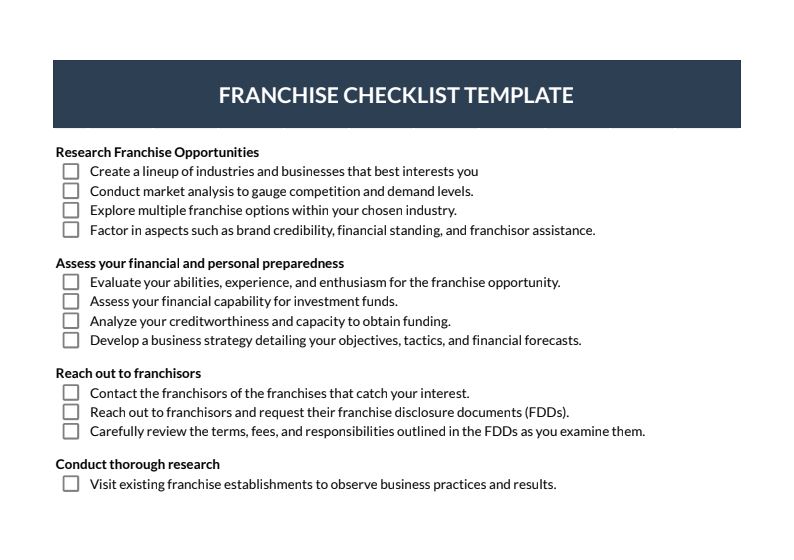
In the franchising industry, going from exploring options to making things happen can be both exciting and tough. Researching a franchise business is where it all begins – it’s like starting an adventure where you look at different opportunities and think about the risks and rewards. But the real challenge comes when you start running things day-to-day. That’s when planning carefully, working hard, and getting things done right become super important. Whether it’s picking the right franchise or figuring out how to make it work smoothly, every step in franchising has its own challenges and chances to succeed. In this guide, we’ll take you through the whole process of turning an idea into a successful franchise, using a Franchise Checklist Template as your guide. We’ll cover everything from the first research to managing everything smoothly, giving you tips and tricks along the way. Let’s start this journey together, making franchising easier to understand and succeed in.
What is a Franchise Checklist Template
A Franchise Checklist Template is a structured document designed to help potential franchisees and existing franchise owners navigate the various steps involved in establishing, managing, and growing a franchise business. It typically outlines essential tasks, considerations, and actions required at different stages of the franchising process.
Whether it’s assessing financial viability, conducting market research, or executing marketing strategies, a well-designed Franchise Checklist Template serves as a valuable tool for achieving success in the competitive franchising industry.
What is the Purpose of a Franchise Checklist Template
The purpose of a Franchise Checklist Template is to streamline and organize the franchising process for both potential franchisees and existing franchise owners. By outlining essential tasks and considerations at each stage of the franchising journey, the template serves as a practical tool for guiding individuals through the complex process of establishing, managing, and growing a franchise business. It helps ensure that no crucial steps are overlooked, provides clarity on what needs to be done, and enables individuals to track their progress effectively.
Benefits of Crafting a Franchise Checklist Template
Identification of Suitable Franchise Opportunities
Through the process of creating a franchise checklist template, individuals gain insights into their strengths, preferences, and market opportunities. This helps them determine which type of franchise business is best suited for their skills, interests, and financial goals, facilitating informed decision-making and increasing the likelihood of franchise success.
Structured Approach
A franchise checklist Template provides a structured framework for organizing strategies, goals, and action steps. This structure helps teams stay focused and aligned with the overall objectives of the business.
Clarity and Direction
By outlining objectives, target markets, and tactics, the template provides clarity and direction. It helps your team understand their roles and responsibilities, enabling them to work towards common goals effectively.
Goal Setting and Measurement
With a franchise checklist template, businesses can set specific, measurable, achievable, relevant, and time-bound (SMART) goals. This allows for better tracking of progress and performance evaluation against predefined metrics.
Resource Allocation
The template assists in allocating resources such as budget, personnel, and time more effectively. By identifying priority areas and allocating resources accordingly, businesses can optimize their efforts and maximize return on investment.
Alignment with Business Objectives
A franchise checklist template ensures that strategies and activities are aligned with broader business objectives, such as revenue targets, market expansion, or product launches. This alignment fosters cohesion across different departments and enhances overall business performance.
Steps in Creating a Franchise Checklist Template
To create a Franchise Checklist Template, start by identifying the key elements and tasks covering each stage of the franchising process, from initial research to ongoing operations. Organize the checklist into sections corresponding to different stages of the franchising journey, such as research, evaluation, financing, and location selection. This division ensures clarity and allows for a systematic approach to navigating the complexities of franchising, facilitating effective decision-making and progress tracking throughout the entire process.
- Research Franchise Opportunities
Start your franchising journey by thoroughly researching various franchise opportunities. Dive into market trends, conduct competitor analysis, and identify potential franchise brands that align with your interests, values, and long-term goals. Take the time to explore different industries and niches to find the perfect fit for your entrepreneurial aspirations.
Include tasks related to researching various franchise opportunities, analyzing market trends, and identifying potential franchise brands that align with your interests and goals.
Read more: A Guide for the Best Franchise Business Opportunities in the Philippines
- Assess your financial and personal preparedness
Before committing to a franchise venture, it’s essential to assess your financial readiness and personal suitability for franchise ownership. Take a deep dive into your financial situation, including your savings, investments, and borrowing capacity. Simultaneously, evaluate your personal skills, experience, and commitment required to run a successful franchise business. Reflect on your management capabilities, leadership qualities, and willingness to adhere to the franchisor’s operational standards and guidelines.
Include tasks to assess your financial capacity, personal skills, and readiness for franchise ownership. This may involve reviewing personal finances, evaluating your management experience, and understanding the commitment required for running a franchise.
- Reach out to franchisors
Once you’ve identified potential franchise opportunities, reach out to franchisors to gather more information and insights. Initiate contact with them, express your interest, and request franchise disclosure documents (FDDs) to gain a comprehensive understanding of the franchise system, its requirements, and expectations. Schedule meetings or interviews with franchisor representatives to discuss your inquiries, clarify doubts, and assess the compatibility between your goals and the franchisor’s offerings.
Include tasks for reaching out to franchisors, requesting franchise disclosure documents (FDDs), and scheduling meetings or interviews to learn more about their franchise opportunities.
- Conduct thorough research
Conducting due diligence is a critical step in the franchising process to ensure informed decision-making and risk mitigation. Thoroughly review the FDDs provided by franchisors, paying close attention to crucial details such as initial investment requirements, ongoing fees, territorial rights, and support services offered. Additionally, leverage your network and resources to gather insights from existing franchisees within the system. Reach out to them, ask questions, and gather feedback on their experiences, challenges, and satisfaction levels with the franchisor’s support and operational systems. Finally, research the franchisor’s reputation, track record, and legal history to assess their credibility and reliability as a business partner.
Include tasks for conducting thorough due diligence on potential franchisors, including reviewing FDDs, speaking with current franchisees, and researching the franchisor’s reputation and track record.
- Obtain Financing
Securing financing for your franchise investment involves a series of critical tasks to ensure adequate funding for your business venture. Start by exploring various financing options available, including traditional bank loans, Small Business Administration (SBA) loans, or alternative funding sources such as investors or crowdfunding platforms. Prepare comprehensive financial statements, including income statements, balance sheets, and cash flow projections, to present to potential lenders or investors. Conduct thorough research to identify lenders or investors who specialize in franchise financing and understand the specific requirements and terms associated with each option.
Include tasks related to securing financing for the franchise investment, such as exploring financing options, preparing financial statements, and applying for loans or funding.
- Choose a suitable location
Choosing the right location for your franchise business is a critical decision that can significantly impact its success. Start by conducting thorough market research to identify potential locations with high demand, favorable demographics, and competitive landscapes. Consider factors such as population density, consumer behavior, local competition, and accessibility when evaluating potential locations. Negotiate leases or agreements with landlords or property owners, ensuring favorable terms and conditions that align with your business goals and budget.
Include tasks for selecting a suitable location for your franchise, including conducting market research, negotiating leases or agreements, and assessing the potential for foot traffic and customer demand.
- Establish your franchise
Setting up your franchise business involves a series of tasks to ensure compliance with legal requirements and operational readiness. Obtain necessary licenses, permits, and registrations required to operate your franchise business in your chosen location. This may include business licenses, health permits, zoning permits, and tax registrations, depending on your industry and location. Purchase equipment, inventory, and supplies necessary to launch your franchise business, ensuring you have the essential resources to meet customer demands and operational needs.
Include tasks for setting up your franchise business, such as obtaining necessary licenses and permits, purchasing equipment and inventory, and hiring staff.
- Execute marketing plans
Developing and implementing effective marketing and advertising strategies is essential to promote your franchise business, attract customers, and build brand awareness. Start by developing a comprehensive marketing plan that outlines your goals, target audience, messaging, and tactics for reaching potential customers. Utilize a mix of online and offline marketing channels, including social media, email marketing, search engine optimization (SEO), print advertising, and local networking events, to reach your target audience effectively.
Include tasks for developing and implementing marketing and advertising strategies to promote your franchise business, attract customers, and build brand awareness.
- Launch franchise operations
Planning and executing the launch of your franchise business is an exciting yet challenging process that requires careful coordination and preparation. Start by developing a detailed launch plan that outlines key milestones, tasks, and deadlines leading up to your grand opening. Coordinate with your franchisor and support team to ensure all necessary preparations are made, including inventory stocking, staff training, and marketing promotions. Execute your launch plan according to schedule, leveraging promotional events, discounts, and special offers to generate excitement and attract customers to your new franchise location. Once your franchise business is up and running, focus on managing ongoing operations effectively to ensure long-term success.
Include tasks for planning and executing the launch of your franchise business, as well as ongoing operations such as managing finances, monitoring performance, and providing ongoing training and support to staff.
- Periodically assess and revise checklist
Regularly reviewing and updating your Franchise Checklist Template is essential to staying responsive to changes in your franchising journey, industry trends, and best practices. By periodically assessing your progress, incorporating new insights, and adapting to evolving circumstances, you ensure that your franchise operation remains agile, competitive, and aligned with your overarching goals.
Regularly review and update your Franchise Checklist Template to reflect changes in your franchising journey, industry trends, or best practices.
Free Franchise Checklist Template

Starting a franchise journey comes with its fair share of challenges. To make things easier, we’ve got a free franchise checklist template for you. It’ll help simplify the whole exploration and management process, saving you the trouble of starting from square one.





